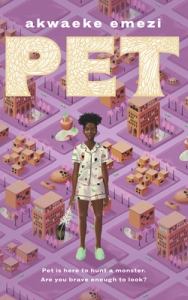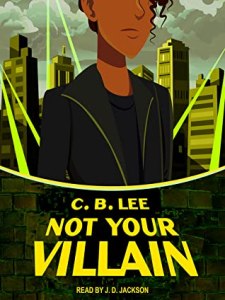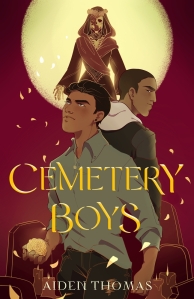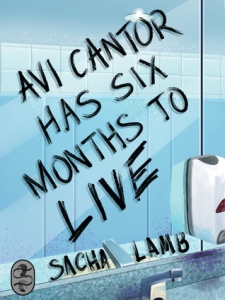Title: Pet
Author: Akwaeke Emezi
Genre: The author doesn’t like genre categorizations, and this book doesn’t really fit a particular genre. Utopian/Low Fantasy is my best guess, but Pet kinda defies categorization.
Trigger Warnings: Violence, child abuse, pedophilia (implied), incest (implied), blood, sexual assault (mention), body horror, medical content (mentions), adultism. Highlight to read spoilers.
Back Cover:
There are no monsters anymore, or so the children in the city of Lucille are taught. Jam and her best friend, Redemption, have grown up with this lesson all their life.
But when Jam meets Pet, a creature made of horns and colors and claws, who emerges from one of her mother’s paintings and a drop of Jam’s blood, she must reconsider what she’s been told. Pet has come to hunt a monster, and the shadow of something grim lurks in Redemption’s house.
Jam must fight not only to protect her best friend, but also to uncover the truth, and the answer to the question–How do you save the world from monsters if no one will admit they exist?
Review:
This is a weird little book with a lot of big things to say. The genre absolutely defies categorization. It’s set somewhere in the future, where some sort of rebellion got rid of all the “monsters” – police, billionaires, racists, bigots, anyone who wouldn’t support the social justice utopia that the town of Lucille (or possibly the entire country?) has become.
This story is driven somewhat by plot and mostly by themes. It’s short (5.5 hours in audiobook, about 200 pages per The StoryGraph), and doesn’t devote much of that space to characterization or worldbuilding. When it comes to characters, it focuses more on the dynamics and relationships between them than giving any of the individuals too much depth. I didn’t mind that very much, though. The characters here are more of a vehicle to experience the story than anything, and I liked seeing the different dynamics between Jam’s family (just her, her mom, and her dad) and Redemption’s family (three parents, a little brother, and aunts and uncles all over the place). Jam and Redemption have one of the healthiest friendships I’ve seen in fiction, and I love that Jam is plot-savvy about the kinds of things that tend to hurt friendships in stories.
The plot is short and straightforward. There are no twists, there are no surprises, and I called the identity of the monster Pet was hunting about halfway through. But it’s engaging enough, and the theme is what matters. This book asks “How do you save the world from monsters if no one will admit they exist?” but it also asks, more subtly, “If we get rid of all the evil in society, how will we put systems in place to make sure it doesn’t appear again?” It’s a story about two friends and an inhuman creature that crawled out of a painting hunting a monster, yes, but it’s also a story about how a one-off rebellion isn’t the final solution, how people who did very good things can also do evil things, and how society needs to have systems in place to stop the evil acts no matter who did them.
The most interesting part of this book to me was how the utopian city of Lucille seemed like something that is theoretically possible in real life, but there are the little details that keep throwing the perfectly realistic world just a bit off-kilter. Sure, there is the terrifying creature of feathers and claws that emerges from a painting, but there is also Jam’s ability to feel what’s happening in her house – who is where, their mood, what they’re doing – with no cue except feeling through the floorboards. Those kinds of fantastical elements don’t fit into the otherwise-plausible world, and I’m not sure what they mean thematically. Maybe that a utopia like Lucille is only possible in fantasy and creating something similar in reality would require more maintenance and vigilance to keep the “monsters” from coming back?
You could probably make an argument that the themes in this book are heavy-handed. They kind of are, but I think it works. I enjoyed it as a story, and I appreciated the wise things it had to say. To me, Pet has the vibe of a book you read in an English class for its important commentary on social issues, but one of those rare English class books that you also happen to enjoy. It’s the kind of book that wins awards and gets lauded for being both a good story and an Important Book. Balancing entertainment appeal and being Important is a difficult act, but I think Pet mostly managed it. It’s definitely worth reading – if you’re not into creatures crawling out of paintings, at least for the philosophical questions it poses.






